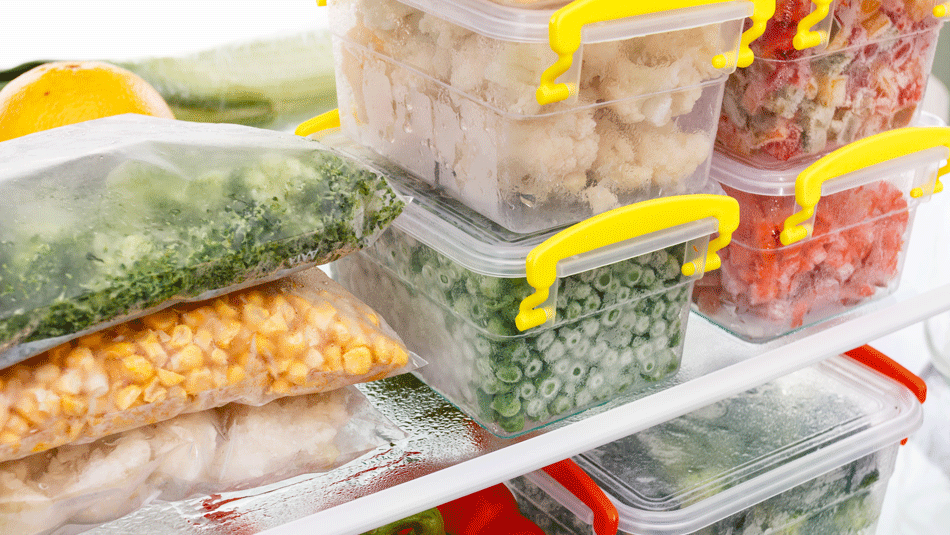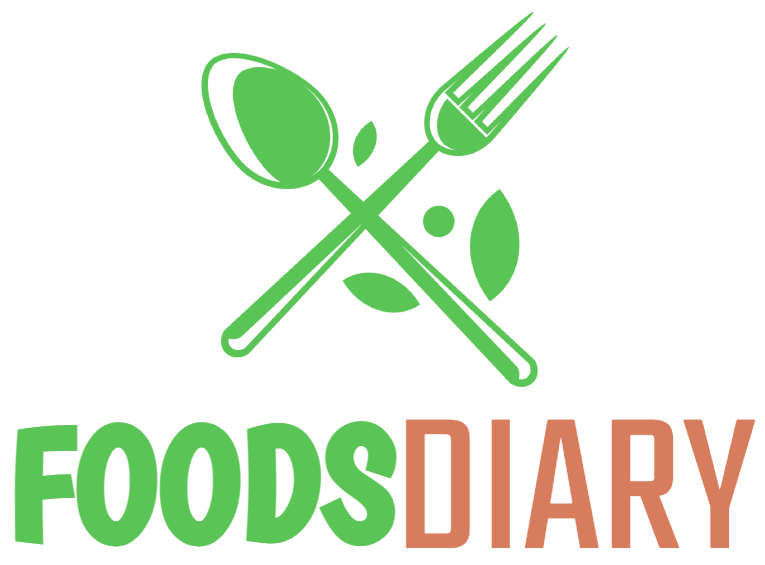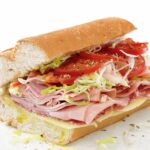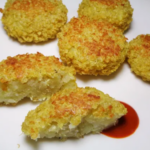Although freezing food is very common in our daily routine, many times little is known about what should not be frozen and why we should not do it. For this reason, before undertaking this task, it can be very useful to know these foods. The most important thing to consider when freezing a food is its biological structure. In addition, it is also important to take into account whether they are fresh, cooked or previously frozen. Foods not recommended for freezing are those that are made up of a lot of water, starches (carbohydrates), dairy products or fats, as well as all those that have several of these characteristics in the same product. On the other hand, those that are previously frozen or cooked in certain ways cannot be frozen either.

Why are there foods that cannot be frozen? Because their structures are not very compatible with low temperatures, since all of the above are altered and lose their essential characteristics. Now, what foods are they exactly we want to share with you the list of foods that cannot be frozen? It can be useful to you on more than one occasion!
High-fat or fried foods
Fat needs to be frozen at a very low temperature and slowly, so home freezing does not work well in many cases. That is, very fatty foods frozen at home can take on a bad taste, smell, lose consistency or go rancid. Consequently, the following foods should not be frozen: eggs, creams, mayonnaise (and other similar sauces), soft cheeses, among others.
However, there are products that contain a certain amount of fat that withstand home freezing better, almost without losing their essential characteristics. In these cases, these foods should be packaged very well before freezing in order to insulate them from the cold as best as possible. Here the following products are profiled: bacon, sausages, very fatty meats, etc. In the case of meat, some experts recommend removing the non-edible parts (fat, nerves, tendons and bones) to improve its preservation in the freezer. However, it will also depend on the destination of the meat; for example, if it is hamburger meat you should leave a certain amount of fat.
Finally, if you freeze fried foods, which are also high in fat, they will always lose their organoleptic characteristics: smell, flavor (they become almost tasteless) and, above all, texture (their consistency becomes soft and unpleasant). For this reason, freezing fried foods is not recommended.
Dairy products
It is preferable to consume fresh dairy products. However, butter and whipping cream can be frozen (although following certain guidelines). With that being said, let’s take a look at which dairy foods should not be frozen:
- Milk. During the freezing process, this food separates its liquid part from its fatty part. Thus, once thawed, many things can happen: its consistency becomes grainy or partially recovers its original texture, it loses much of its organoleptic characteristics or it can go rancid. For these reasons, freezing milk is not recommended. It is important to mention that the fatter this food contains, the worse the final result will be.
- Cheese. In this case it depends on the type of cheese. Soft or creamy cheeses are never frozen, as they will lose all their essence, while hard cheese can be frozen (first wrapped in plastic wrap before packaging), but it will only serve to add it to tacos, make some sauces or on the pasta because it will lose consistency and fall apart when you cut it.
- Yogurt. This dairy does not react well to very high temperatures, because when it thaws it loses its texture and can be cut. In this case, it also applies that the greater the amount of fat, the worse the result.
Finally, it is important to highlight that foods prepared with dairy products should not be frozen either.
Eggs
In principle, eggs in their original state are foods that cannot be frozen for several reasons:
- During the freezing process, the egg expands, since it contains abundant liquid and a semi-rigid shell. Because of this, there is a risk of it breaking or exploding.
- The components of the egg, both fatty and liquid, do not withstand the freezing process well. Consequently, this food loses much of its organoleptic characteristics. In addition, the fat contained in the egg tends to go rancid when frozen, deteriorating its taste and smell.
In conclusion, the egg cannot be frozen, raw or cooked. It is also not advisable to freeze products that contain it among their ingredients, such as mayonnaise, sauces, cakes, puddings, mousse, flans, etc. It is advisable to always consume fresh or refrigerated eggs.
However, there are exceptions to almost every rule, so while all of the above is true, some people argue that cracked eggs can be frozen with acceptable results. In this case, there are two ways to do it:
- Separate the white from the yolk. Once separated, they should be kept in containers for freezing food. This is the most recommended option.
- Beat the yolks and whites together. Add a pinch of salt or an acidic ingredient to it, so the yolk won’t harden when it thaws.
Despite the above, it should be noted that meringue, which is made with beaten egg white and sugar, should not be frozen because it becomes moist and sticky.
Mayonnaise, cream and emulsified sauces
Due to the fact that these foods are quite delicate, especially if they are prepared with eggs, cream and flour, in general, it is not advisable to freeze emulsified sauces because they lose their properties and/or they cut. However, there are exceptional cases of certain sauces that can be frozen without damage, but their properties are always altered. This is the case of béchamel sauce, which can be frozen but loses part of its texture.
Among the sauces that we should never freeze are mayonnaise, aioli and hollandaise sauce, among others.
Fruits that cannot be frozen
In the case of fruits, it is not advisable to freeze them, since they generally contain a large percentage of water (the most watery have between 84-92%). Due to this, during the freezing process, ice crystals form inside these foods, changing their internal structure. Consequently, its organoleptic characteristics are negatively affected. That is, you will get a fruit with a mushy texture, tasteless and discolored or blackened.
But as we mentioned before, usually each rule has its exception, this would be the case of red fruits, bananas and citrus without skin, which can be frozen. In fact, it is common to freeze these foods to make, for example, homemade ice cream or smoothies, such as banana ice cream. The remaining fruits, on the other hand, can only be frozen if you cook them beforehand, as well as impregnated in sugar or syrup.
Vegetables that cannot be frozen
Although most vegetables can be frozen, you can never freeze them to eat raw. That is, vegetables cannot be frozen to prepare them in salads or any other preparation that requires raw vegetables. Instead, they work very well in stews and other cooked preparations.
Why? Because although these foods keep very well frozen (especially thanks to previous treatments such as blanching or blanching), they do not retain the essential characteristics of fresh foods. So if you want to freeze vegetables, you might want to check out the short list below:
- Vegetables that we can freeze fresh or cooked: spinach, peas, zucchini, among others. This group is to be consumed exclusively in stews, cooked salads and other preparations that require cooking.
- Vegetables that we cannot freeze raw but can be prepared: the tomato should not be frozen as it is, but it can be frozen in sauce.
- Vegetables that we can never freeze: all those foods that are made up mostly of water or starches. The best examples of this case are reflected in lettuce and potatoes (although the latter is not eaten raw). Even if you decide to prepare them in a recipe, freezing would be unfavorable. The foods in this group can only be consumed raw or cooked at the moment.
Potatoes
Although we have just named it, it deserves a special mention because its biological conformation rejects freezing, twice! Yes, this food is made up mostly of water and starch, both of which are incompatible with this preservation technique.
It is interesting to mention that when the potato is thawed, it does not go bad and cannot harm us, but its texture changes, it becomes brittle, floury, and loses flavor. For this reason, if you want to freeze a dish that includes potato, do not prepare it with this vegetable from the beginning, and better add the potato after defrosting the dish.
For all of the above, the potato omelet cannot be frozen either. This recipe is made up of problematic ingredients for the freezing process: eggs and potato. In principle, it is not recommended to freeze the potato omelet, since it falls apart when thawed. This happens because of the potato starch. In addition, the potato loses flavor and consistency. However, there are those who freeze the potato omelet using the following trick: freeze the mixture without cooking (the beaten egg, salt to taste and the already fried potatoes). When defrosted, it should simply be cooked.
Aromatic herbs
In this case, something very similar happens to what happens with some vegetables and a large part of the fruits, the important percentage of liquid of these plants does not make them good candidates for freezing. Why? Mainly, because they lose much of the aroma. In addition, they change their appearance and texture.
Despite all this, many people freeze aromatic herbs in various ways: in a paste like pesto (perhaps the most effective), wrapping the leaves in aluminum foil or freezing the leaves in ice cube trays (filled with water, olive oil, olive or melted margarine).
Seafood that should not be frozen
Although most shellfish can be frozen raw and at home (as long as it’s fresh, never frozen shellfish from the supermarket), there are some that we need to cook before processing like this or simply eat as quickly as possible, as they don’t they can freeze. Here is a short list that can serve as a guide:
- Seafood that should not be frozen raw, but rather cooked: spider crabs, crabs, lobsters and Norway lobsters.
- Seafood that should not be frozen dead, but alive: clams and cockles.
- Seafood that should not be frozen at all: barnacles.
Pies, homemade cakes and other desserts that cannot be frozen
This type of preparation contains among its ingredients not one, but several compounds that are incompatible with freezing: milk, eggs, starches and fats. Therefore, it is not recommended to freeze homemade cakes and pastries, although there are people who do.
This group includes cakes, biscuits, muffins, cupcakes, and other similar desserts (with or without filling and topping). In the case of cold cakes, only those that do not contain gelatin can be frozen. In this case, the problem lies in the unfavorable change in the characteristics of the dessert (texture, smell, taste, appearance, etc.). Of course, food poisoning is unlikely.
Pudding, flan and custard
These desserts contain eggs and milk, so they are not good candidates for freezing, as they curdle when thawed. In addition, they lose all their sensory characteristics.
Jellies
Gelatin is formed by bonds of molecules, these bonds, subjected to high temperature, break. Consequently, the gelatin loses its consistency and flavor, but without any harmful repercussions for health. Also, freezing this food does not extend its shelf life, as no matter how you store it, it will last 7-10 days. For all these reasons, gelatin should not be frozen.
Likewise, meals or desserts prepared with gelatin should not be frozen either, as they lose texture and consistency.
Russian salad
Another recipe with two ingredients that are incompatible with the freezing technique is Russian salad, since they have mayonnaise and potatoes (which together contain eggs, fat and starches). However, although the Russian salad cannot be frozen as is, it also has its trick. This consists of simply freezing the vegetables (already cut), so the day we prepare the salad we defrost them, cook them (steamed or boiled), drain, and add the rest of the ingredients.
Pasta and rice
Both foods contain starches, which are why, in principle, they do not appear to be good candidates for a freezing process. However, in the case of rice, it will depend more on the type of preparation and the technique used to freeze it. So if you want to freeze it, you can be guided by the different techniques that we propose in the article: “Can you freeze rice?”.
As for the pasta, it is not recommended to freeze it in any way, since defrosting it greatly alters its properties. Even so, there are people who do it, although with unsatisfactory results. The exception is fresh pasta, which can be frozen before cooking.
Now that you know the foods that cannot be frozen, avoid subjecting them to low temperatures in order to maintain all their properties and enjoy their benefits.



